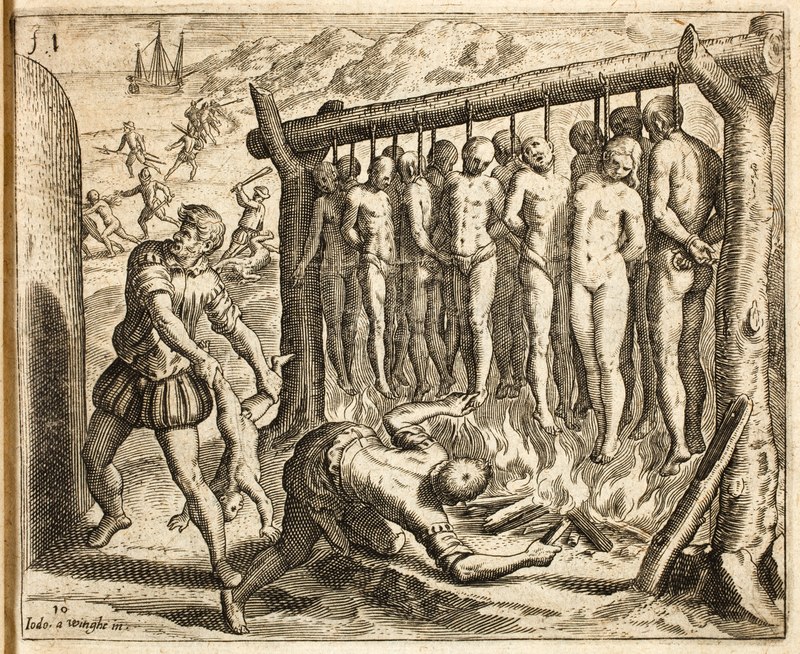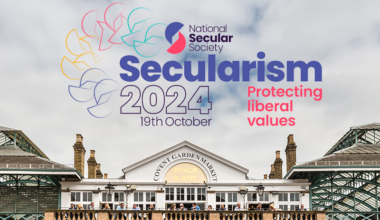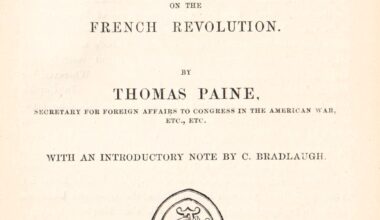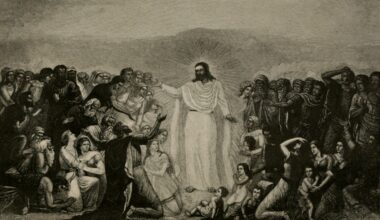Last month, historian Tom Holland was interviewed by Konstantin Kisin and Francis Foster on their podcast, Triggernometry. Holland is the author of Dominion: The Making of the Western Mind (2019), in which he argues that even secular and non-Christian residents of Western countries still view world through a fundamentally Christian lens. In his words, Western society is ‘utterly saturated’ by Christian ‘concepts and assumptions’. In the Triggernometry episode, entitled ‘Islam, Christianity & the West’, he expounded on this argument in response to questions from Kisin and Foster.
The influence of Christianity on modern society is a hot topic in the podcast world, and Christianity has won no shortage of non-Christian defenders who argue that, even if the supernatural claims of the Bible aren’t true, its values and ethics have built our civilisation.
Holland’s argument in Dominion, and on the podcast, is reasonably modest. Unlike some of his fans, he does not credit the success of Western countries to Christianity. However, he still argues that concepts such as the rule of law, science, and human rights either sprung out of Christian soil or were tended by Christian thinking as they grew.
It is certainly true that religion is a powerful transformative force on any society—perhaps the most powerful. In the sixteen centuries since Christianity became the official religion of the Roman Empire in 380 AD, it has deeply permeated Western philosophy, politics, art, literature, language, and ways of thinking. However, many of our attitudes and values have changed in unrecognisable ways, and it is possible to overstate the durability of the Christian thread running through the fabric of the West. In my view, Holland does overstate it.
There are fairly simple objections to Holland’s argument that he struggles to answer. In the Triggernometry episode, Kisin pointed out to Holland that, throughout its history, Christianity has often not been practised in line with the principles modern Christians associate with it. A person arguing for a secular state which respects human rights can certainly find passages to support their worldview in the Bible. But for most of the time in which Christianity has been a state religion, Christian authorities have read the same passages very differently.
Holland responded that Christianity has evolved and changed through ‘a long process of weathering and transformation’. Christianity, he said, is ‘a great pulsing matrix of paradoxes’, and ‘there is a lot of material there that can provide sanction for a broad, broad array of responses’. The problem with this view, though, is that the history of Christian thinking, and more importantly, Christian practice, has seen more seismic shifts than gradual weathering. The Scientific Revolution and the Enlightenment are big examples, while the movement away from institutional racism and the death penalty and towards civil rights and the emancipation of women in the latter half of the twentieth century are others. The principles were always there throughout, but the practice changed completely.
The debate at Valladolid—and on Triggernometry
In one exchange, Foster pressed Holland on the brutality of the Spanish and Portuguese Empires in the Americas. Foster’s point was a very good one. In the massacre and enslavement of native American peoples, the conquistadores showed values more akin to the fighters of Islamic State in Iraq and Syria in the 2010s than any person in a modern, secular Western country, despite having at their fingertips all of the same scriptures. ‘I saw here cruelty on a scale no living being has ever seen or expects to see’, wrote the humanist friar Bartolomé de las Casas following the savage massacre of the Taíno people of Cuba at Caonao. The conquistadores burned Taíno people at the stake for refusing to convert to Christianity, or if they did convert, enslaved them and forced them to work on encomienda plantations.
Holland’s response was to point out that Christianity provided a restraint on the conquistadores as well as a justification—or excuse—for their cruelty. In both Dominion and the Triggernometry episode he referred to las Casas an example. After witnessing the atrocities of the conquistadores, las Casas became an advocate for the rights of the native peoples of the Americas, an advocacy that was deeply rooted in his Christian faith.
In the Valladolid debate of 1550-1551, las Casas argued his case against another scholar and theologian, Juan Ginés de Sepúlveda. Sepúlveda believed that the Spanish conquest and subjugation of the native Americans was justified by both religious and natural law. In the Triggernometry episode, Holland claimed that Sepúlveda drew on Greek philosophy while las Casas argued from the Gospel, and las Casas’s arguments showed the beginnings of ideas which would ultimately feed into international law.
It is true that the central plank of Sepúlveda’s case was Aristotle’s theory that some men were natural masters and some men were natural slaves. To Sepúlveda, unsurprisingly, the Spanish were the natural masters and the native Americans the natural slaves. However, it’s an oversimplification to characterise the Valladolid debate as a face-off between Greek philosophy and the Gospels. Both las Casas and Sepúlveda drew on a wide range of religious and non-religious sources, and Sepúlveda made theological arguments with reference to both the Old and New Testaments. The debate is interesting and important for what it tells us about sixteenth-century notions of human rights, but it did not have much of an impact on the real world. The Spanish crown resolved to introduce measures to promote better treatment of the native Americans, which, sadly, had little effect on the far side of the Atlantic. It may be possible to find the beginnings of international law in las Casas’s arguments, as Holland claims, but only in retrospect. And given that Christianity had been Europe’s state religion for nearly twelve hundred years at this point, it was a very late beginning.
The Valladolid debate—and the European colonisation of the Americas generally—shows the fundamental problem with trying to find a Christian thread of continuity through Western thinking. A huge range of positions, from embracing native Americans as brothers and sisters to enslaving them, could be justified with religious arguments. And even if Christian principles were good, judged from our twenty-first-century standpoint, they seemed to have limited influence on how Christians acted in practice.
Moral relativism from moral certainty
The discussion on the Spanish colonisation of the Americas highlighted two broader issues with Holland’s central argument. Rather than provide certainty and consistency to Christian societies, Christian values have been heavily influenced by the societies in which Christians have lived. Ironically, given that the supporters of political Christianity tend to accuse their opponents of moral relativism, their own moral system has proven to be extremely relativistic. And secondly, given that so many positions have been justified from Christian theology, the argument that Christianity has been essential to any particular strand of Western liberal thinking—for example, the abolition of slavery—becomes unfalsifiable.
These issues can be seen on Triggernometry in the broader discussion on slavery which followed the conversation on the Spanish colonisation of the Americas. Holland accepted that the Bible does not explicitly condemn slavery, but still argued that the case against slavery made by abolitionists in the eighteenth and nineteenth centuries was fundamentally Christian. In Dominion, he wrote at length about Quaker abolitionist Benjamin Lay, and in describing the abolition of slavery in the British Empire, wrote that ‘an age of enlightenment and revolution had served to establish as international law a principle that derived from the depths of the Catholic past’.
It is true that there are verses in the Bible which promote the idea of the universal equality of man, and also true that evangelical Christianity gave the abolitionist movement much of its moral authority and social urgency. On Triggernometry, Holland explained that seventeenth-century English evangelicals began to believe that a person needed to be inspired by the Holy Spirit to read scripture correctly. These evangelicals, reading the scripture through this lens, decided that slavery was fundamentally un-Christian. Holland’s conclusion on slavery is that we only accept that it is an appalling crime because we judge it by Christian standards.
While Christian churches have often been at the forefront of social movements, they have just as often bobbed along in the social and economic current of their societies. Slavery gives us one example. In 1845, the American Baptist church split over the issue, with southern Baptists supporting slavery and northern Baptists calling for its abolition. It is, of course, no coincidence that the Southern Baptists interpreted scriptures in a way which excused or even condoned slavery when their society was economically dependent on it. The adherents of a religion can read the same scriptures in wildly different ways based on their social context. This is not restricted to Christianity—consider, for example, the very different readings of the Qur’an and Hadiths by educated liberal Muslims raised in post-Enlightenment Western countries and those of conservative clerics in the Islamic world.
Ultimately, Holland’s argument cannot be disproven because any interpretation of scripture could be justified on the basis that it was inspired by the Holy Spirit. If the majority of Christians in a historically Christian country take the position that something is bad (or good), we have no grounds on which to say that they have not made their judgement on fundamentally Christian standards.
Rendering unto Caesar
Does this mean that Christianity has had nothing to do with the success of the Western world? Not at all. Just as anyone who tries to argue that modern Western civilisation is built on Christian foundations needs to contend with centuries of religious violence, slavery, authoritarianism, and persecution, anyone who tries to argue that Christianity is irrelevant to it needs to contend with the fact that the Enlightenment, the Scientific Revolution, and the rise of liberal democracy all came out of historically Christian countries in northern and western Europe.
In the Triggernometry episode, Holland pointed out that Christianity is unusual for having a concept of the secular. He quoted Jesus’s command to ‘render unto Caesar the things that are Caesar’s, and unto God the things that are God’s’ (Matthew 22:21, and in the other Gospels). This verse, and the philosophy behind it, is critical. It is fair to say this is one of the single most important lines in the Bible, and in the Western canon generally.
Christian Europe had traditionally separate religious and secular authorities—a Catholic Church headed by a Pope and nations ruled by kings. This division had little impact in practice while the religious authorities were united, but became highly significant after the Protestant Reformation shattered the edifice of central spiritual authority. After more than a century of vicious warfare, Catholics and Protestants, and members of rival Protestant sects, were forced to accept that they could not re-impose religious uniformity by force. This led to religious pluralism and opened the door to new ideas. The division of the religious and the secular was possible because Christianity was never founded as a state religion. In its earliest form, it was an apocalyptic sect unconcerned with politics, and even as a state religion, it never quite lost this character.
Conclusion
The impact of religion on society is a fascinating area of study, and the impact of Christianity on traditionally Christian Western societies is no exception. The faith has left a cross-shaped indent in our collective minds. But at the same time, it is very easy to overstate its importance. Holland may be right that modern Westerners can only view the world through a Christian lens. At the same time, to make the argument he makes in Dominion and on Triggernometry, you need to view Christianity itself through a modern, liberal, secular lens. This mindset only comes from being thoroughly basted in the values of the Enlightenment, and it is a completely alien worldview to centuries of Christian thinking. Secularism may be facilitated by Christianity, but modern Christianity has itself been made secular. It is as much a product of our values as a foundation to them.
Related reading
Did Christianity make the Western mind? (a review of Tom Holland’s Dominion), by Charles Freeman
‘Do as I say, not as I do’: a review of ‘Dominion’ by Tom Holland, by Nicholas E. Meyer
A reading list against the ‘New Theism’ (and an offer to debate), by Daniel James Sharp









Your email address will not be published. Comments are subject to our Community Guidelines. Required fields are marked *
Donate